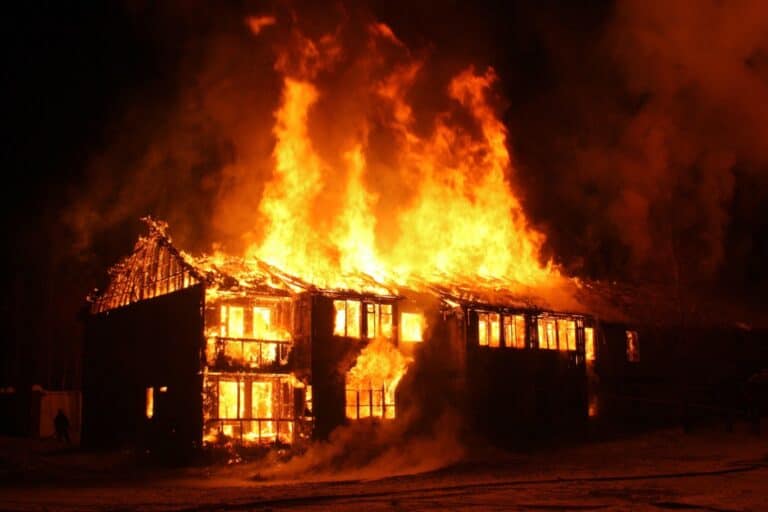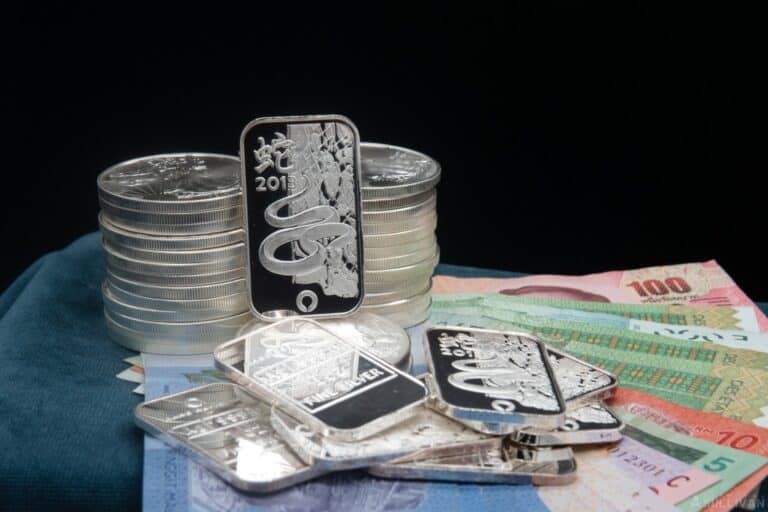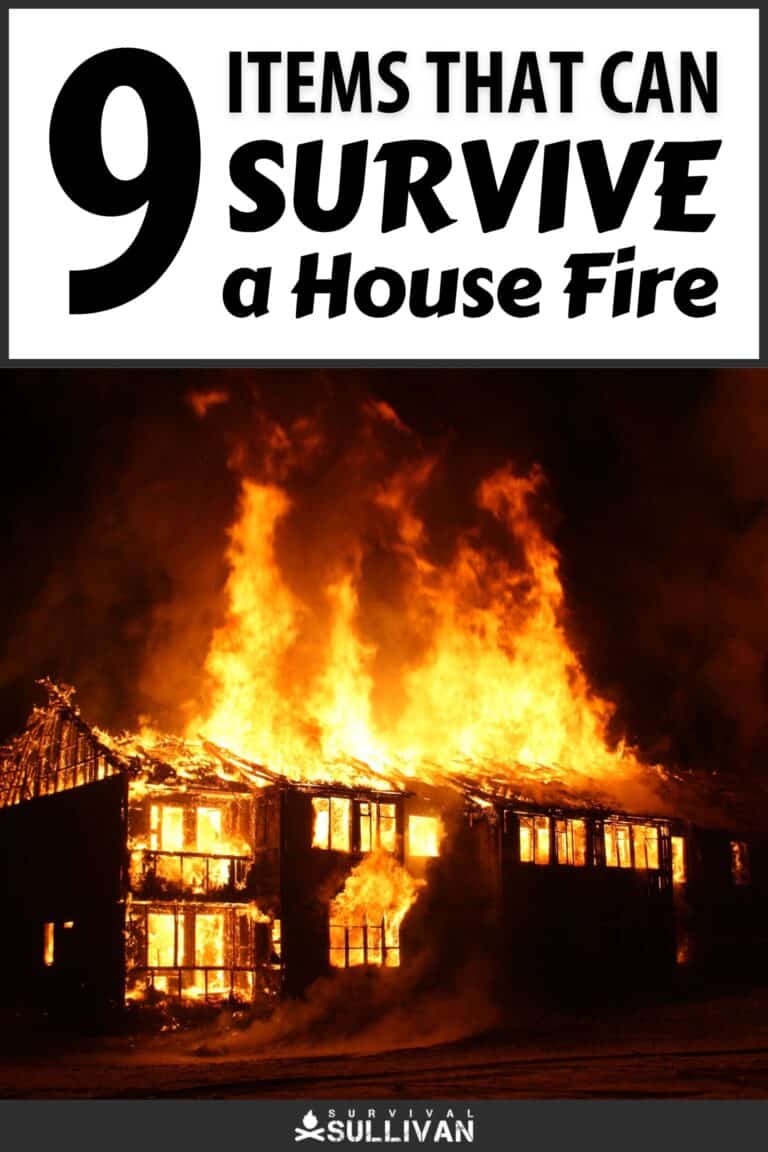A house fire is one of the most traumatic events a person can experience. In an instant, a small spark can quickly spiral out of control into a full-blown house fire.

Temperatures will quickly reach staggering highs. There is little that can be done to protect your cash and any material goods from such intense heat no matter how prepared you are.
The only question on the minds of most in such a situation is what they will be able to salvage from the rubble. But not even the immense heat of a house fire can destroy quite everything.
Some things will survive the flames. Today we will be telling you about 9 such items that you can expect to survive a house fire.
9 Items That Can Survive a House Fire
The incredible heat generated by your average house fire goes far beyond what most of us can imagine.
In a matter of moments, the temperature of the room where the fire is can reach, and top, 600 degrees Fahrenheit!
With just a little time and plenty of fuel and air, the temperature can soar until it reaches upwards of 1,400 degrees Fahrenheit(760°C). Yet, not everything is fundamentally vulnerable to fire.
Some items will, more or less, survive the flames, and some things are made of material that is invulnerable to even those frightening temperatures we described.
1. Precious Metals
Precious metals of all kinds are proof against the typical temperatures of a house fire. Be it gold, silver, or platinum, you can expect to find them scorched or, in some cases, melted but they will retain their value by weight if they can be recovered after a fire.
This can be a cold comfort for those who are storing wealth in the form of precious metals in their homes, but it is worth considering as part of an asset protection plan.

Generic 1 oz. sliver bars, a cheaper way to stack silver
Gold melts at 1,948 degrees Fahrenheit and silver at 1,762 degrees. The highest temperatures typically reached in a house fire are far below those necessary to melt gold and silver so it is not surprising that these metals will survive such an event.
Especially if these metals are stored in an area that is unlikely to experience the most intense heat, or if inside a container that will afford them some protection, your gold and silver will fare well.
Keep this attribute in mind when it comes to jewelry, also. Most jewelry is made of precious metals and so will survive some pretty intense temperatures.
Yes, part of the value of the piece will be lost, especially if collectible or rare, but the base materials will retain their value. And that brings us to our next entry.
2. Stones
Like precious metals, stone is inherently resistant to high temperatures. This means that things like stone countertops, flooring and more will survive at least the heat of the fire if not the collapse of the structure and weight of rubble after an event.
This also applies to jewelry as described above since precious stones are similarly invulnerable to the heat of a house fire.
Diamonds, rubies, sapphires, and other gems can survive a fire more or less totally intact and retain their value.
Diamond is indeed born of immense heat and pressure, and will not melt unless exposed to temperatures exceeding 7,000 degrees.
Rubies are not quite so durable but will still not melt until temperatures upwards of 3,700 degrees so you can expect them to be just fine.
Sapphires and other expensive gems are similarly resistant to heat so you can expect them to make it through a house fire more or less unscathed.

3. Fire-rated Safes
Fire-rated safes may or may not survive a house fire and remain functional, but that is by design: they are designed to shield the objects stored within them from the intense heat of a fire.
They accomplish this by being lined with insulation, like fiberglass or ceramic board, and are sealed airtight or equipped with heat-activated expanding seals so that no oxygen enters the safe to feed flames.
The fire-rating of a safe varies, and is based on its ability to protect the contents for a certain period of time and temperature range.
The best safes can withstand temperatures as high as 1,200 degrees for upwards of two hours, which is far more intense and longer lasting than a typical house fire.
However, such performance usually comes at an immense cost; most common, cheaper units offer less protection for a half-hour or less.
Nonetheless, safes of this kind can be sized to fit most valuables and are a great investment for protecting all sorts of things- from documents to guns, jewelry, and electronics -from fire.
Just be sure to choose a reliable brand, with proven test ratings, and in all cases, always install your safe in an area as distant from likely sources of the fire.
4. Metal Tools
Most folks know already or know now, that many metals are highly resistant to heat and even open flames.
This means that most of our metal tools are highly likely to survive a house fire and even the most intense of house fires.
This includes everything from tools like hammers, saws, shovels, screwdrivers, and the like to fasteners and building materials such as nails and screws.
Such metals are primarily composed of steel alloys that are subsequently heat-treated for strength and durability, meaning they can resist temperatures upwards of 2,000 degrees Fahrenheit before melting.
This is another grim comfort for the survivor of a house fire since they might be needing those tools to repair or rebuild the home now lost.
5. Metal Cookware and Cutlery
Just like the tools discussed above, metal kitchen implements have proven before that they can stand the heat.
It is part of their job description, after all! Most stainless or alloy pots and pans withstand open flame, while non-stick and specially coated cookware will be damaged beyond use since their coatings will be charred.
Cast iron cookware is the undisputed champion in this regard: it can survive temperatures up to 2,200 degrees Fahrenheit before melting, though critical damage might occur before that temp.
Similarly, most cutlery is composed of durable alloys and thus will make it out of the fire relatively unscathed.
6. Ceramics
Not all ceramics are equal when it comes to surviving intense heat but there are certain kinds that can withstand temperatures up to 2,000 degrees Fahrenheit due to their excellent thermal resistance.
This means that certain kinds of cookware, tile, toilets, and sinks, even artwork and collectibles can survive a house fire.
Now, in the case of the latter items it does not mean that their fine details, paint, pigments, and so forth will survive intact and unblemished, but the item itself will remain intact and, in some cases, can be restored.
Porcelain is comparable to ceramics in terms of survivability when it comes to heat.
7. Shelf-Stable Sealed Foods
Believe it or not, most shelf-stable foods will be safe and edible if they are not consumed by the flames or heated to the point that their packaging will fail.
If cans are not bulging or charred, and other packaged remain sealed, the contents are probably safe to consume.
As always, if you have any doubt whatsoever about the safety or edibility of food, just toss it out.
But, if you are in truly dire straits after a house fire (perhaps in the aftermath of an accompanying major disaster) you can likely salvage some food from the ruins.
8. Appliances
Appliances large and small that are not obviously melted or damaged by the fire will probably remain functional after a house fire.
This is especially true of older appliances made with more metal and less plastic, and especially less electronics.
Modern appliances are a bit more of a mixed bag and the outcome depends on the type, brand, and individual unit.
In some cases, even those that appear unscathed may have had their electronic parts damaged by smoke or other fire debris and thus need to be replaced.
But, surprisingly, some prove to be quite durable. Once more, if in doubt make it a point to carefully test the appliance before relying on it.
9. Anything Submerged
More a strategy or stroke of luck than an actual “item”, it is worth pointing out that things submerged in water can survive a house fire.
This phenomenon has been seen time and time again in the cases of hidden stashes and desperate attempts to protect goods from wildfires.
If you have a stash of valuables in a sealed container and place them in a bucket, toilet tank, tub, pool, or other sizeable containers of water then they may, just maybe, survive the fire.
You will, of course, rarely have any time to implement this strategy if you are around when a house fire threatens, but if you are preparing for wildfire season or just want to put together a contingency stash that can survive a fire, keep this trick in mind.
Some Items May Not be Totally Destroyed, but Still Ruined
Something else you’ll want to keep in mind regarding items on this list and other items that are involved in a house fire.
Your possessions need not be completely obliterated by a fire to be lost. Sometimes exposure to intense heat or even just being exposed to smoke can ruin them.
Everyone knows how clothing and furniture that survives unburned is still rarely usable ever again due to smoke contamination.
Then you’ll have to contend with the firefighting efforts made to save the home or limit damage.
Being drenched with water or exposed to the chemicals from fire extinguishers can much of the time be just as destructive to your possessions as the fire itself.
This is certainly a case of acceptable losses when done to try and save the home and the other things in it.
And even in the case of some items that seem truly fireproof, like the metal implements we discussed, intense heat might ruin them even if it doesn’t destroy them.
Steel tools like knives might lose their temper or heat treat well below the temperature at which they melt, perhaps weakening them structurally to an unsafe degree or just severely degrading their future performance.
Similarly, tools and appliances are rarely made of metal alone, and plastic, wood or fabric parts might be completely destroyed while leaving the metal components intact and completely serviceable.
For instance, a prized heirloom axe could be left just a head if the wooden handle is burned away!
Keep these things in mind, and consider any item that survives a raging house fire a blessing.

The post 9 Items That Can Survive a House Fire appeared first on Survival Sullivan.
By: Tom Marlowe
Title: 9 Items That Can Survive a House Fire
Sourced From: www.survivalsullivan.com/items-surviving-a-house-fire/
Published Date: Thu, 16 Feb 2023 16:00:00 +0000
-------------------------------------------------------------------------
Did you miss our previous article...
https://outdoorsnewswire.com/survivalist/natural-disasters-in-florida-what-to-expect
 CampingSurvivalistHuntingFishingExploringHikingPrivacy PolicyTerms And Conditions
CampingSurvivalistHuntingFishingExploringHikingPrivacy PolicyTerms And Conditions
